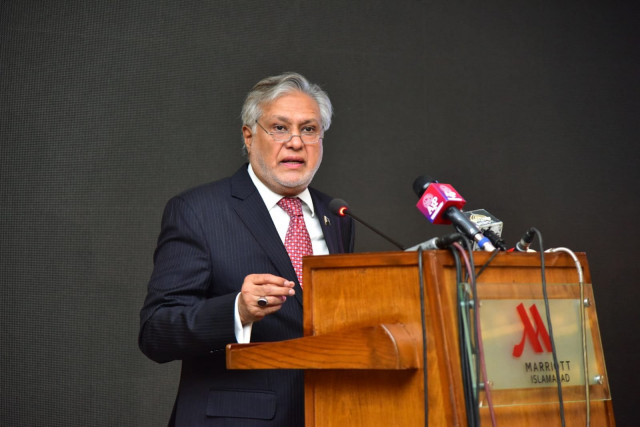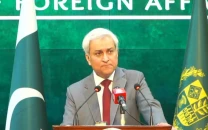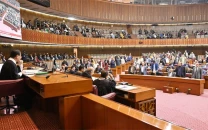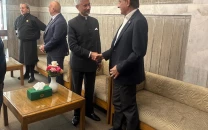Dar unable to give firm date for IMF deal
WB urges Pakistan to withdraw Rs340 billion annual subsidies to the rich

The World Bank on Thursday urged Pakistan to withdraw Rs340 billion annual subsidies being availed by the rich amid Finance Minister Ishaq Dar’s inability to give a firm date for the staff level agreement with the International Monetary Fund.
But Dar’s ministry sees Pakistan remaining in the Fund’s programme from a short- to medium-term period. The finance secretary argued in a World Bank and Ministry of Finance jointly organised seminar, held in a five-star hotel, that there was no solution in the short-term “except to implement the IMF programme”.
“We seem to be very close to signing the staff-level agreement,” said Dar while speaking at the seminar on reviving the economic stability through strengthening of the Public Financial Management (PFM).
Incidentally, the finance ministry officials responsible for the poor budgeting were sitting on the stage, including those who have developed a habit of reprinting budget books for the past three years after committing blunders in the first set of published books.
Dar briefly spoke about the staff level agreement but could not give a firm date. “We have been in the process of the 9th review which has taken longer than it should have,” said Dar in his televised speech. Responding to a question whether the deal can be announced today (Friday), Dar said that he did not say it.
But he said that Pakistan was “absolutely committed” to completing the Extended Fund Facility Programme with the IMF.
The finance minister on February 10 had said that Pakistan and the IMF would reach the staff level agreement in a few days – a narrative that is now losing the attraction. A day earlier, the State Bank of Pakistan Governor Jameel Ahmad also said that Pakistan was close to finalisation of the IMF deal but he, too, did not give a firm date.
Dar reiterated that Pakistan will implement all the sovereign commitments that the previous government had made. After Dar left the venue, the media was instructed to vacate the hall.
Pakistan faces a severe economic crisis and the international credit rating agencies have downgraded the country on fear of high risk of default.
“In the short-term, there is no solution but to implement the IMF programme,” said Hamed Yaqoob Sheikh, the secretary finance. In his presentation, the secretary Finance showed that “from short to medium term”, Pakistan will be in the IMF programme.
The current IMF programme is going to end in June and the use of the title from short to medium term against the IMF programme suggests that the Ministry of Finance is thinking of getting another IMF programme.
The secretary’s presentation showed the title of “economic plan” from medium- to long-term.
The current account deficit is unmanageable; the tax to GDP ratio is low and the propensity to save in the economy is rapidly declining, said the Secretary Finance. He further stated that the pension bill was getting out of control and the debt was increasing rapidly.
The secretary further said that the privatisation programme has not worked and there was a need to think about something else.
To fix the current crisis and move towards sustainable economic growth, Pakistan needs to fix its budget, said Tobias Haque, the lead economist of the World Bank. The government can cut spending that contributes little to growth and development, including Rs340 billion annual subsidies that primarily benefit the better off, said the lead economist.
The government expenditures have done little good for long term development and growth in Pakistan,
“How can an economy grow when 70 percent of recurrent expenditures are on rigid items such as pension, subsidies and interest expenses?” asked Tobias.
The government can improve revenues by increasing taxation on assets and property, closing the exemptions that cost around 30% of the total GST every year, said Tobias. He said that the government can save perhaps a trillion rupees, in terms of reduction in subsidies and losses.
Tobias suggested that the government can ensure sound implementation of its Public Finance Management Act, which will create better link between planning and budget, improve cash management functions, and the implementation of the treasury single account. These technical reforms could save Rs160 billion annually, he added.
Dar also admitted that the severity of the economic crisis was worse than he thought. “Frankly, from a distance I did not know how deep the quagmire was.”
“This time the quagmire was deeper and much more complicated than that of 1998 and 2013,” said the Minister.
The finance minister said that Pakistan was going through a rough patch today and it was important for everyone to contribute to overcoming these challenges.
Last week, the finance minister approved Rs18.4 million additional budget for the PM’s House for the employees-related expenses.
Dar once again said that Pakistan will not default. “This persistent fake propaganda regarding the country defaulting on its international obligations is completely ill and is harming the country,” he maintained.



















COMMENTS
Comments are moderated and generally will be posted if they are on-topic and not abusive.
For more information, please see our Comments FAQ